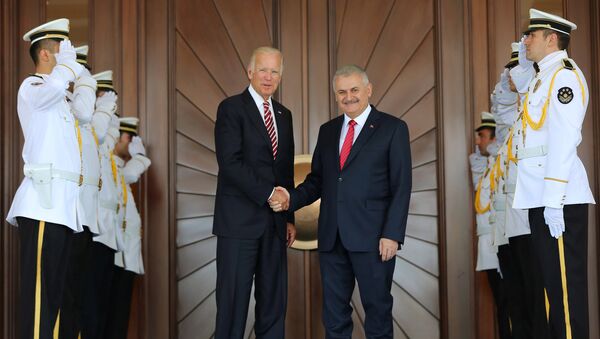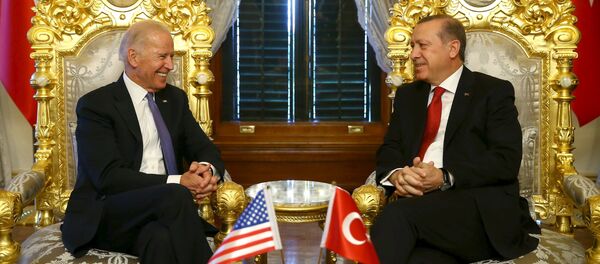"Russia's relations with Turkey have changed, making the Americans nervous," deputy director of the Russian Institute for Strategic Studies said.
Washington "usually sends Biden to deliver tough demands," he added. "I think that [the White House's] message for Turkey will be the following: President Recep Tayyip Erdogan should not improve relations with Russia and Turkey should not join forces" with Moscow to resolve the Syrian crisis.
Smolin further said that Biden will "draw lines that Erdogan must not cross" during his August 24 visit.
This process has manifested itself in a thaw between Turkey and Russia. Ankara also restored its ties with Israel and making inroads with Iran. Yildirim also pledged to foster cooperation with Damascus in what is a major departure from Turkey's former strategy of supporting radical groups trying to overthrow Syrian President Bashar al-Assad.
The United States appears to be unhappy with Turkey's U-turn. Smolin suggested that Washington wanted Erdogan to explain what foreign policy direction Ankara was taking. Biden, according to the analyst, will also tell Erdogan that fostering relations with Russia was not in Turkey's interest.

Although Ankara is Washington's ally, the United States will still try to exert pressure on Turkey. "They think that permanent pressure always leads to some results. I think this is an age-old tradition that they follow under any circumstances even in relations with their allies," Smolin said.
State Department spokesperson Mark Toner largely refrained from commenting on the issue during the Tuesday's press briefing, saying only that Turkey remains a "valuable partner" in the anti-Daesh coalition. He also added that Biden had "good, fruitful meetings with the government and his counterparts" before they actually took place a day later.
Kemal Kirisci, the TUSIAD Senior Fellow in the Foreign Policy Program at the Brookings Institution, noted that the visit comes at a time when Washington's response to the failed coup and Western media coverage of the purges that followed promoted "deep anti-Americanism" in Turkey.
"Turks want to know why Western leaders and media failed to express any empathy with the trauma their country suffered through, and why they are reluctant to applaud the public's stunning defense of Turkish democracy," the analyst said.
Kirisci also said that anti-American sentiments in Turkey have not prevented both countries "from working together on a wide range of issues in the past, despite the ups and downs in bilateral relations."





